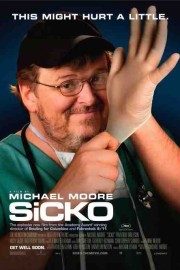SiCKO
If the anthology film “Paris je a’temie” inspired me to want to fall in love in Paris, and “Ratatouille” made me dream of eating French food on a daily basis (even if the chef is a lovable rat), Michael Moore’s latest look at the contradictions and confusions of life in America sealed the deal for wanting to move there with three simple words- Universal Health Care. As Groundskeeper Willie said once, stupid cheese-eating surrender monkeys.
Of course, Moore’s goal isn’t to get anyone to move to France (or Canada, or England, or Cuba, or any other country with Universal Health Care). Moore is fundamentally an optimist who believes in the American Dream. His goal isn’t to make people leave the country but fix it by showing us how our elected (and non-elected) leaders have been acting as Robin Hood’s evil twin by robbing the poor to give to the rich. Though a true-blue liberal, Moore isn’t an ideologue who simply attacks the right (The right’s just been an easier target, folks. At least, it has been since January 2001…); he’s got no love for people who sellout the left, either (I wouldn’t be surprised to see Hilary’s poll numbers drop after people see this movie).
What strikes you first about “SiCKO”- Moore’s scathing expose of the profit-first, patient-second philosophy of today’s health care system- is that he’s tempered the level of irony that usually results in some truly dark comedy. It’s a sharp change of pace from his Oscar-winning “Bowling for Columbine,” his box-office smash “Fahrenheit 9/11,” and his 1989 landmark debut “Roger & Me” (only 1998’s “The Big One” stands out as mild among Moore’s films), though a necessary one. For the first time since “Roger & Me,” Moore’s focus is as much on the regular people affected by the system as it is on the system itself. It’s an important evolution, as Moore- who posted a message on his website asking people to tell him their horror stories- is telling stories where, more so than any of his other films, the larger issue is a fundamental moral question where a person can live or die depending on the decisions made by them, who- sadly- tend to favor the bottom line over the individual.
It’s impossible not to be incensed by the system while watching the film. A system which forces a man who- after having accidentally chopped off the tips of two of his fingers- has to choose which one to fix after he’s told one will cost $60,000 and the other will cost $12,000…and that’s WITH insurance! A system which, even though his wife works at a hospital, allows a cancer-striken father/husband to die after deeming the procedure that could save him is “experimental,” even though it clearly isn’t. A system which dumps people off on the street, or forces them to go home, when they can’t afford to pay anymore, as opposed to when they’re healthy. A system which is more than happy to prescribe expensive medication to treat someone instead of really helping them get better. Though it’s unfortunate that 50 million Americans are without health care, what does it matter when the 250 million of us who do find it largely worthless when we need it most?
To be fair, Moore makes himself an easy target for his detractors (one of whom he even lends a hand with this film) with his snarky commentary, blatant grandstanding, and the obvious staging of some of his efforts. His films have never displayed the in-depth investigating and context his books have, and to be fair, he does skirt some issues in interest of simplicity. No matter. His approach is blunt, but wickedly effective. And whether he’s chronicling his hometown’s decline into poverty, witnessing the effects of outsourcing while on a book tour, trying to figure why Americans are so gun happy, building a case against the president to take to the court of public opinion, or raging against the machine of medical capitalism, Moore displays a genuine humanism that can’t be faked or taught. He may be the center of his films, but the subject at hand- and the people it affects- are always his focal point. On that front, “SiCKO” may be his best film since “Roger & Me.” If it actually inspires change, it may even become more significant than that.










